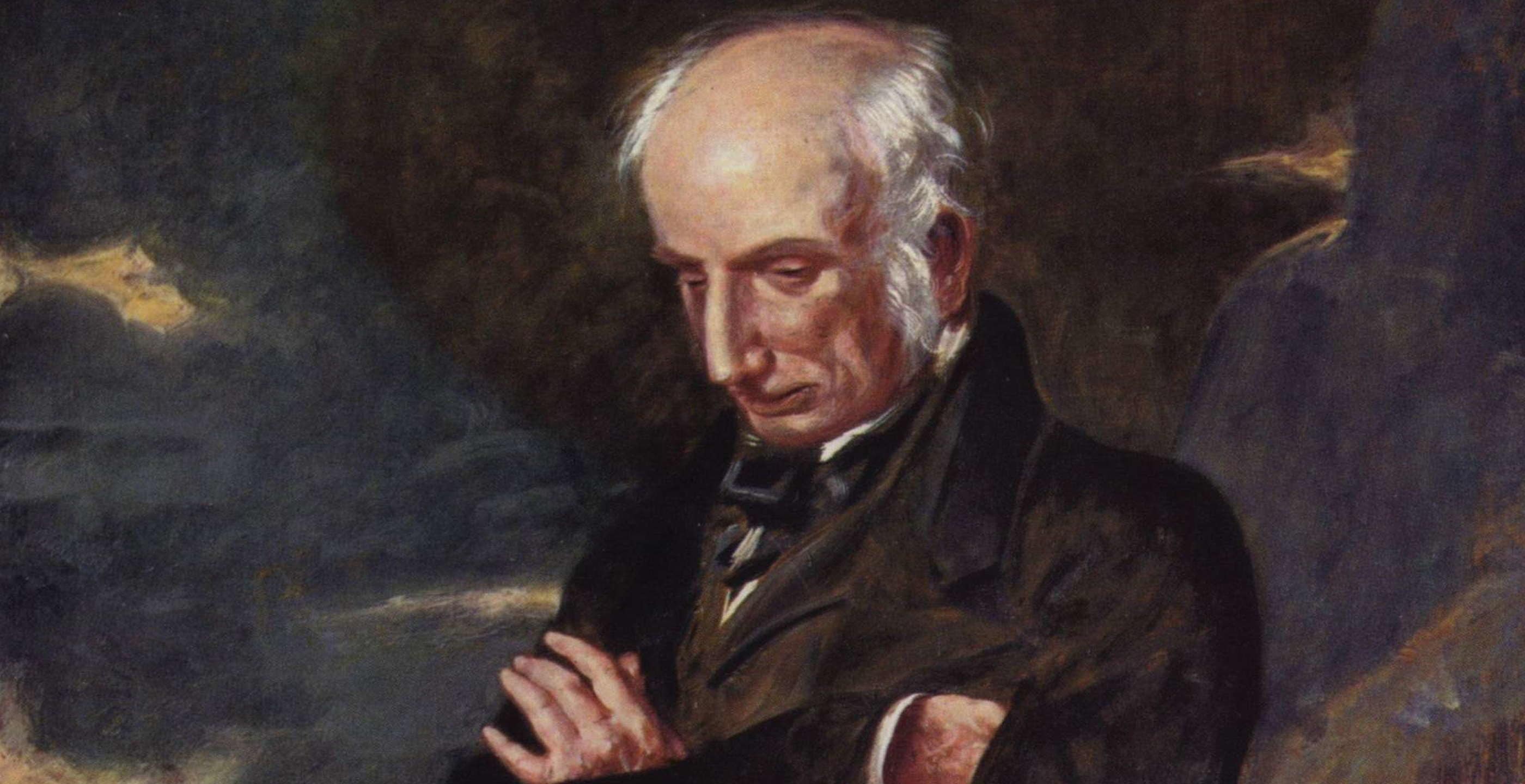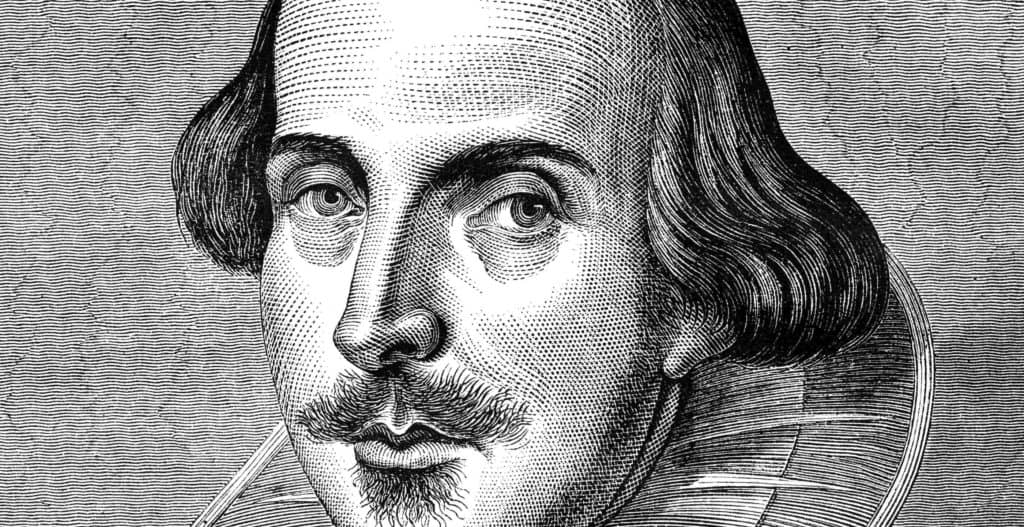One of England’s most beloved poets and a pioneer of Romanticism, William Wordsworth was made Poet Laureate in 1843.
William was born in Cockermouth in Cumbria on 7th April 1770 to John Wordsworth, a legal agent and his wife Anne, and was the second of five children. He would remain close to his sister Dorothy throughout his life; like William she also became a poet.
He grew up in an impressive mansion house in the Lake District. However his childhood was not a happy one: the children’s relationship with their father was not close and would remain so until his death.
Nevertheless, despite their strained relationship, John Wordsworth did leave an important impression on young William, instilling in him the importance of literature. Wordsworth’s wealth afforded William the opportunity to use his father’s library to learn and be inspired by some of the literary greats.
Whilst his exposure to literature was critical, it was his childhood in the Lake District and his time spent at his grandparents’ house at Penrith which would have a notable impact on Wordsworth’s subject matter in his poetry. It was in this setting that Wordsworth, for long periods of time, would find himself out in the countryside, an escapism both figuratively and literal.
Tragically William’s mother died when William was seven years old and his father passed away just six years later. William was taken in by his mother’s family, sadly separating him from his sister Dorothy with whom he had developed a close bond, as she was sent away to live in Halifax with their mother’s cousin. He remained at Penrith where his initial education was based on tradition and religion.
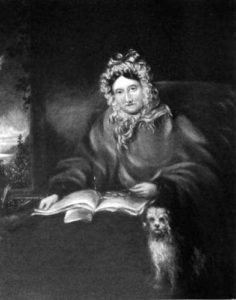 Dorothy Wordsworth
Dorothy Wordsworth
To complete his schooling he was sent to Hawkshead Grammar School which had a much stronger emphasis on scholarly pursuits and was a stepping stone to higher education. William’s time at Hawkshead was productive, as his new curriculum embraced mathematics and literature as well as Latin which became a particular favourite for Wordsworth. With the assistance of his schoolmaster he was also encouraged to write poetry, an important influence for this talented young boy.
Whilst at Hawkshead he boarded with Hugh and Ann Tyson at a local hamlet. It was whilst staying in this community with its strong Quaker tradition that he began to formulate his own opinions on matters pertaining to religion, society and nature.
He had already become strongly influenced by his natural surroundings whilst staying at Penrith, choosing to wander away from his sad and stifling family life and embracing the natural world instead. This became a critical influence on Wordsworth’s work, his focus on nature forming the backbone of the Romantic Movement and its spiritual journey through literature and art.
After Hawkshead School, in October 1787 Wordsworth moved on to St John’s College Cambridge where, as he himself would later note, he did not achieve any particular brilliance. However it had an important effect on challenging his ideas and evolving attitudes to life.
In his final summer as a Cambridge student, he decided to tour the Alps with his friend Robert Jones. Departing from Dover in July 1790, the two young men set off on a walking tour of Europe, an experience which would influence his literary work as well as his political and social conscience.
Whilst living in France, Wordsworth became increasingly aware of social issues affecting everyday men and women. The context of the French Revolution and the rise of democratic values based around equality were concepts which would influence him. His travels also had an impact on his personal life, conceiving a daughter called Caroline in France. Leaving before her birth, he would later return to France in 1802 with his sister to meet her.
It was in France that some of Wordsworth’s earliest poetry, “An Evening Walk and Descriptive Sketches”, was published in 1793. He would continue to travel, finding further inspiration for his poetry.
Back in Britain, he would go on to marry his childhood sweetheart Mary Hutchinson with whom he would have five children, sadly only three of whom would reach adulthood. His family eventually settled down in Grasmere in the Lake District.
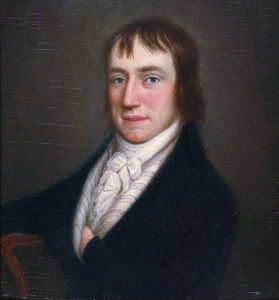 William Wordsworth, 1798
William Wordsworth, 1798
Wordsworth’s literary career really took off when in 1795 he met fellow poet Samuel Taylor Coleridge. Together, they composed “Lyrical Ballads”, first published in 1798, a collection of poems that instigated an entire literary, artistic and cultural movement: Romanticism.
The two poets had intended to embrace poetry using the vernacular which would make it more accessible to the everyday man. Wordsworth himself explained that the whole process was experimental, embracing new ideas on style, form and structure to create an entirely new kind of poetry.
The natural world would take on a didactic quality in many of his works, as in the poem “The Tables Turned” written in 1798 and included in his collection of “Lyrical Ballads”.
“Come forth into the light of things, Let nature be your teacher”.
This characterises Romantic poetry as a genre as well as Wordsworth’s focus on nature as a guide for human knowledge, themes echoed in other works completed in the same era.
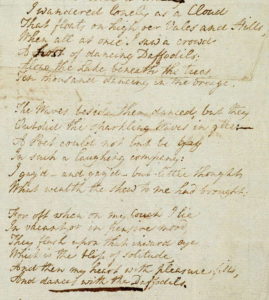 Hand-written manuscript of Wordsworth’s ‘I wandered lonely as a cloud’, also known as ‘Daffodils'(1802).
Hand-written manuscript of Wordsworth’s ‘I wandered lonely as a cloud’, also known as ‘Daffodils'(1802).
One of his most famous poems, “I Wandered Lonely as a Cloud”, was inspired by a bed of daffodils witnessed by William and his sister on a visit to Ullswater. Nature proved to be a pervasive theme throughout his literary career.
One of Wordsworth’s most prolonged projects, which he failed to see published, was his famous work “The Prelude”. This esteemed work is an autobiographical poem which he initially began working on in 1798 and continued to refine throughout his life.
The content of the poem reflects the different stages of his life; his youth, childhood, education and later years are divided into fourteen sections, using style, structure and form to enhance the impact. His stages of life are conveyed symbiotically with the personification of nature, reflecting his spiritual and personal growth.
Wordsworth’s contribution to poetry was eventually recognised in 1843 when he became Poet Laureate. Only seven years later he passed away from pleurisy on 23rd April 1850.
“The Prelude” was published three months later by his wife Mary, a fitting tribute to a great poet with a striking literary career and incredible legacy in British literature.
Jessica Brain is a freelance writer specialising in history. Based in Kent and a lover of all things historical.
